Immunogenicity of premalignant lesions is the primary cause of general cytotoxic T lymphocyte unresponsiveness
- PMID: 18573907
- PMCID: PMC2442645
- DOI: 10.1084/jem.20072016
Immunogenicity of premalignant lesions is the primary cause of general cytotoxic T lymphocyte unresponsiveness
Abstract
Cancer is sporadic in nature, characterized by an initial clonal oncogenic event and usually a long latency. When and how it subverts the immune system is unknown. We show, in a model of sporadic immunogenic cancer, that tumor-specific tolerance closely coincides with the first tumor antigen recognition by B cells. During the subsequent latency period until tumors progress, the mice acquire general cytotoxic T lymphocyte (CTL) unresponsiveness, which is associated with high transforming growth factor (TGF) beta1 levels and expansion of immature myeloid cells (iMCs). In mice with large nonimmunogenic tumors, iMCs expand but TGF-beta1 serum levels are normal, and unrelated CTL responses are undiminished. We conclude that (a) tolerance to the tumor antigen occurs at the premalignant stage, (b) tumor latency is unlikely caused by CTL control, and (c) a persistent immunogenic tumor antigen causes general CTL unresponsiveness but tumor burden and iMCs per se do not.
Figures
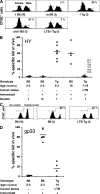
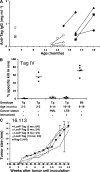
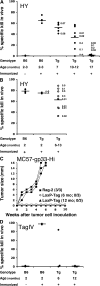
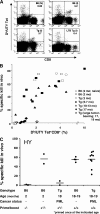
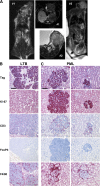
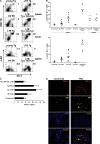

References
-
- Speiser, D.E., R. Miranda, A. Zakarian, M.F. Bachmann, K. McKall-Faienza, B. Odermatt, D. Hanahan, R.M. Zinkernagel, and P.S. Ohashi. 1997. Self antigens expressed by solid tumors do not efficiently stimulate naive or activated T cells: implications for immunotherapy. J. Exp. Med. 186:645–653. - PMC - PubMed
-
- Schell, T.D., B.B. Knowles, and S.S. Tevethia. 2000. Sequential loss of cytotoxic T lymphocyte responses to simian virus 40 large T antigen epitopes in T antigen transgenic mice developing osteosarcomas. Cancer Res. 60:3002–3012. - PubMed
Publication types
MeSH terms
Substances
LinkOut - more resources
Full Text Sources
Other Literature Sources
Molecular Biology Databases

